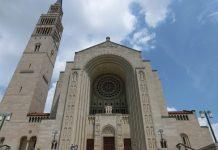Rome (Thursday, May 19, 2016, Gaudium Press) Here is a ZENIT translation of the address Pope Francis gave during this morning’s general audience in St. Peter’s Square
Dear Brothers and Sisters, good morning!
Today I wish to reflect with you on the parable of the rich man and of poor Lazarus. The lives of these two persons seem to run on parallel lines: their conditions of life are opposite and altogether cut off one from the other. The front door of the rich man’s house is always closed to the poor man, who lies outside there, looking for something to eat from the table of the rich man. The rich man wears luxurious garments, whereas Lazarus is covered with sores. Every day the rich man banquets lavishly, while Lazarus is dying of hunger. Only the dogs look after him and come to lick his sores.
This scene reminds us of the harsh reproach of the Son of Man in the Last Judgment: “I was hungry and you gave me no food, I was thirsty and you gave me no drink, I was […] naked and you did not clothe me” (Matthew 25:42-43). Lazarus well represents the silent cry of the poor of all times and the contradiction of a world in which immense riches and resources are in the hands of a few.
Jesus says that one day that rich man will die: the poor and the rich die, they have the same destiny, as do all of us; there are no exceptions to this. And then that man turns to Abraham, begging him with the appellation of “father” (vv. 24.27). He claims, therefore, to be his son, belonging to the People of God. Yet in life he showed no consideration to God; instead, he made himself the center of everything, shut-in in his world of luxury and waste. Excluding Lazarus, he did not take into account either the Lord or His Law. To ignore the poor is to scorn God! We must learn this well: to ignore the poor is to scorn God.
There is a particular point in the parable to be noted: the rich man does not have a name, but only the adjective “rich”; whereas the name of the poor man is repeated five times, and “Lazarus” means “God helps.” Lazarus, who lies in front of the door, is a living call to the rich man to remember God, but the rich man does not receive that call. Therefore, he will be condemned, not because of his riches, but for having been incapable of feeling compassion for Lazarus and helping him.
In the second part of the parable, we find again Lazarus and the rich man after their death (vv. 22-31). In the beyond, the situation is reversed: poor Lazarus is carried by the Angles in Heaven to Abraham; the rich man, instead, is plunged among torments. Then the rich man “lifted up his eyes, and saw Abraham far off and Lazarus in his bosom.” He seems to see Lazarus for the first time, but his words betray him: “Father Abraham – he says – have mercy upon me, and send Lazarus to dip the end of his finger in water and cool my tongue; for I am in anguish in this flame.” Now the rich man recognizes Lazarus and asks him for help, whereas in life he pretended not to see him. How many times many people pretend not to see the poor! The poor do not exist for them. Before, he went so far as to deny him the leftovers from his table, and now he wants him to bring him something to drink! He still believes that he can assert his rights because of his previous social condition. Saying that it is impossible to grant his request, Abraham in person gives the key to the whole story: he explains that goods and evils were distributed to compensate for the earthly injustice, and the door that in life separated the rich man from the poor, has been transformed into “a great chasm.”
As long as Lazarus was at his house, the rich man had the possibility of salvation, by opening wide the door, helping Lazarus, but now that they are both dead, the situation has become irreparable. God is never summoned directly, but the parable puts one clearly on guard: God’s mercy to us is linked to our mercy to our neighbor; when the latter is lacking then the former does not find space in our closed heart, it cannot enter. If I do not open wide the door of my heart to the poor, that door remains closed, also for God. And this is terrible.
At this point, the rich man thinks of his brothers, who risk having the same end, and he asks if Lazarus can return to the world to warn them. But Abraham replies: “They have Moses and the prophets; let them hear them.”
We must not wait for prodigious events to be converted, but we must open our heart to the Word of God, which calls us to love God and our neighbor. The Word of God can make an arid heart revive and heal it of its blindness. The rich man knew the Word of God, but he did not let it enter his heart, he did not listen to it, therefore, he was incapable of opening his eyes and having compassion for the poor man. No messenger and no message can substitute the poor we meet on the way, because in them Jesus Himself comes to encounter us: “Truly I say to you, as you did it to one of the least of these my brethren, you did it to me” (Matthew 25:40), says Jesus. Thus, hidden in the reversal of fortunes that the parable describes is the mystery of our salvation, in which Christ joins poverty to mercy.
Dear brothers and sisters, listening to this Gospel, all of us, together with the poor of the earth, can sing with Mary: “He has put down the mighty from their thrones, and exalted those of low degree; He has filled the hungry with good things, and the rich He has sent empty away” (Luke 1:52-53).
[Original text: Italian] [Translation by ZENIT]









































